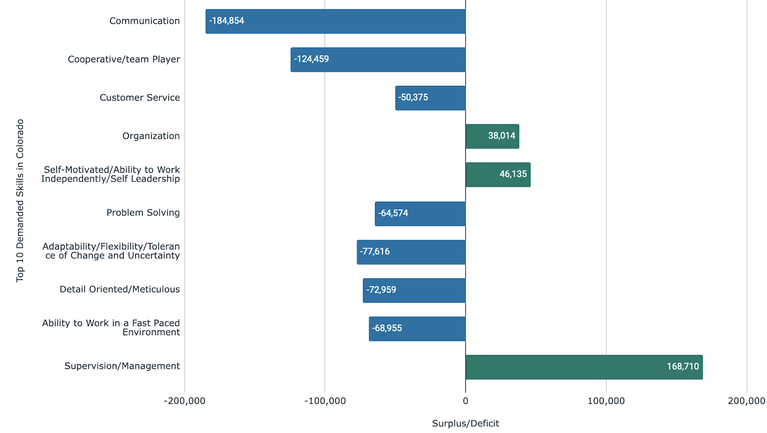By Caitlin McKennie, Talent Pipeline Economist
March 15, 2024 - Much attention was given to the nuanced trends showcased in the 2023 Talent Pipeline Report. This was especially true with the upticks in the average level of postsecondary completion demanded by employers to attain high-demand, high-need jobs. One suggested explanation is that this increase in demand could likely be due to the type of skills one gains from postsecondary attainment and/or work-based learning. In 2023, core (or essential) skills appeared four times more often than technical skills in Colorado job postings relative to technical skills.
Experiences acquired through postsecondary education and work-based learning allow learners and workers to develop abilities that are often not constrained to one specific occupation. With the surge in AI demand across the globe, more employers are seeking skills that cannot be readily replaced by automation such as problem-solving, juggling large responsibilities, and working well with others. At the same time, many national studies are seeing that younger individuals joining the labor market for the first time lack the top core skills that help them succeed in a role (Cengage/Morning Consult). These skills include (but are not limited to) critical thinking; innovation and creativity; the ability to deal with complexity and ambiguity; and communication.
The difference between landing a good, quality job can come down to how well job seekers can adjust to a fast-paced environment and interact with colleagues. New research reports that, at a national level, communication is ranked as the most in-demand skill that companies are hiring for as of the first quarter of 2024. Communication is also the number one skill listed in Colorado’s job postings between February 2023 and February 2024 (see the figure below). This skill is increasingly valuable to employers, in part, due to its transferability across a wide range of sectors.
- The need for better communication in the workplace is likely driven by multiple factors, including:
- The rise of AI in the labor market;
- The widespread adoption of remote and hybrid work;
- The increasing number of different generations participating simultaneously in the workforce – each with different communication styles – as the population ages and lives longer; and
- Diversity and inclusion, as all voices should feel that they are heard in a workplace.
Cooperative/team player and customer service ranked second and third, respectively in Colorado for job postings between February 2023 and February 2024. At the same time, adaptability, currently in seventh place across Colorado job postings, is the skill that is projected to increase in demand the fastest across the U.S. over the upcoming years.
Colorado’s Most In-demand Skills vs. Talent Supply: February 2023 - February 2024
Source: Chmura Econometric Modeling Platform, 2024
Note: Data reported below showcases the 10 most in-demand skills by Colorado employers based on unique job postings in the state between February 2023 and February 2024, and the associated surplus or deficit of job seekers with those skills. Job seekers equipped with these skills are measured through resume forensics during the same period. Skills listed along the vertical axis are ranked in order by most demanded, beginning with communication.

Core skills are commonly achieved through career advancement experiences where programs are specifically designed to teach individuals to have a core-skilled mindset, such as being a continuous learner or highly resilient. The widening gap between employer demand and job seekers without core skills could likely be due, in part, to the disengagement of interpersonal and conflict-resolution experiences one would typically experience while progressing along one’s career pathway had the pandemic not occurred. As we continue to adjust to the “new normal” of the workplace, expanding opportunities that provide individuals with the core skills toolbox required to succeed will remain a critical priority for individuals to carry a competitive edge in the labor market.
What’s Next for Our Research Publications?
Last year the CWDC, in partnership with the Colorado Department of Higher Education (CDHE), reviewed previous Talent Pipeline Reports and considered the information included, what is required by statute, timing of annual data releases, those engaged with the content of the report, and how the information can be most valuable to readers. Based on this analysis, the decision was made to update how Talent Pipeline Reports are shared.
As with previous years, the in-depth annual Talent Pipeline Report will be published in December and include everything required by Colorado statute. In addition, quarterly editions will examine topics based on release timing of state and federal data, new forecasts, and other data that become available. This will allow for information to be shared in a more timely fashion and for a deeper dive into certain topics. The first Talent Pipeline Report Spring Edition will be published in the coming weeks and is focused on Colorado’s learners (at all ages) through a workforce readiness lens. Stay tuned!